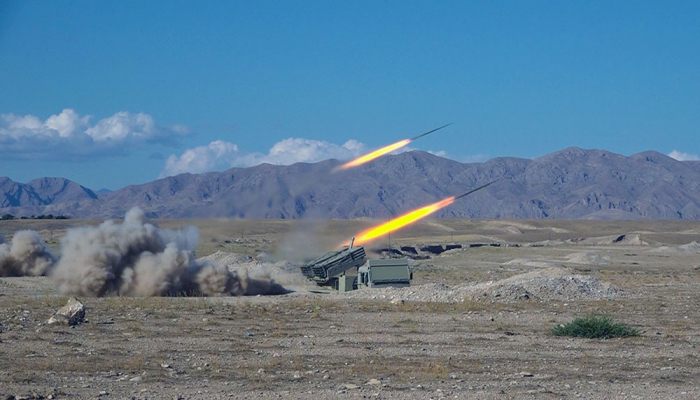By Dr. Ashfaq Ahmed and Ms. Saima Kausar
The 44 Days War was followed by the November 10, 2020 Armenia, Azerbaijan and Russia signed ceasefire agreement brought South Caucasus in the spotlight of international community. Russian sponsored agreement resulted in humiliating defeat for Armenia. Nikol Pashinyan, Armenian Prime Minster called the ceasefire agreement "incredibly painful both for me and both for our people". It ascertained Azerbaijan’s victory. The agreement kept Armenians down, Russia in, the America and France out of South Caucasus.
Armenia instead of drawing fruitful lessons and conclusion that warfare is futile activity, inherits death and destruction. Therefore, it should not be waged in pursuit of seeking or preserving national interests. In my interview published on January 21, 2021, I predicted that the “issue is not over yet”. I claimed because “not only politicians, but the entire Armenian population is socially, psychologically and emotionally attached to these lands,” (Karabakh). Verifiable events are proving my claim that Armenia is preparing for revenge so the issue is not over yet e.g. Armenian forces resort to unprovoked shelling first on July 28, 2021 in Kalbajar district of Azerbaijan, followed by unprovoked shelling on Azerbaijani posts in Nakhchivan on August 1, 2021. In third incident recorded on August 6, 2021, Armenian troops targeted Azerbaijan’s positions in Heydarabad settlement of Sadarak province in Nakhchivan.
Armenian forces resort to deliberate unprovoked shelling is endangering long-awaited peace and stability. Planned shelling is blatant violation of negotiated Ceasefire Agreement. The agreement legally/morally binds Armenian armed forces to abstain from aggressive activities and abide by internationally accepted principles. Yet, Yerevan is on purpose ignoring President Ilham Aliyev’s calls for comprehensive peace aimed at achieving regional economic integration, poverty eradication and sustainable development.
Armenian unprovoked provocations ascertain the fact that Armenian politico-military leaders are war obsessed. Armenian leadership believes in Clausewitz old dangerous dictum “war is continuation of policy by other means.” Inference can be drawn that, despite military defeat Armenia is not ready to give up its hostile activities. Armenian armed provocations are continuously endangering South Caucasus peace and stability.
Question to be answered in present circumstances: why is war obsessed Armenian leadership threatening regional peace and security now? Perhaps, Yerevan based strategic planners have carefully completed the three prong strategic process to determine causes of Armenian occupation forces humiliating defeat in 44 days war. Strategic planners would have first of all assessed Armenian army’s operational policy and military tactics in Karabakh. Secondly, the task to critically review Azerbaijan’s novel military strategy resulting in signing of the agreement of “historic importance,” would have been completed. Third, strategic planners would have devised a new plan to avenge humiliating defeat and illegally reoccupy Azerbaijan’s sovereign territories.
Second answer to the abovementioned question is military planning, deployments and strategies of both antagonists has traditionally remained focused on Karabakh. Multiple conclusions can be drawn from Armenian ongoing onslaughts in Nakhchivan. First, it can be attempt to divert the attention of Azerbaijan’s military planners from Karabakh to Nakhchivan and retake lost territories by surprise. Secondly, recent provocations or gradual escalation of the conflict affirm Armenia is restoring strength in pursuit to horizontally escalate the conflict from traditional battlefield Karabakh to new heights in Nakhchivan. Clock is ticking, the enemy is at the gate and third war is approaching. It requires Baku to orchestrate a new war-winning strategy and quick military deployments prior to the outbreak of third inevitable war in the evolving warzone. Aim of the recent provocations can also be to drag Azerbaijan in an unnecessary war by overstretching Azerbaijan’s military forces. Yerevan failed to understand that it require both neighbors to allocate increased defence budgets for the procurement of additional military equipment and for the recruitment of additional military personnel. Consequentially, regional integration and long desired sustainable economic development will succumb to a new arms race. The increased defence budget would unquestionably put additional economic burden on economies of both countries.
International society, organizations, permanent five members of the United Nations Security Council (UNSC) and world media is focused on evolving situation in Afghanistan in the wake of Taliban advances. Armenia an opportunist and revisionist country is seemingly in haste to take advantage of Afghanistan war in its favour to overturn the tripartite ceasefire agreement. It wants to wage third war or at least border war to redraw the political map with its Eastern neighbor. Another explanation of the continued violations of Moscow brokered agreement is, seemingly Pashinyan administration is making attempts to i) divert attention of opposition towards border clashes, ii) send message to demoralized armed forces and the masses that the war with Azerbaijan is not over yet and country’s political map will be redrawn, and iii) it is traditional “rally round the flag,” tactic applied by Pashinyan to break up opposition forces and gather essential support from the masses for the continuation of his reign. In conclusion, international community should respond to Yerevan’s gradual attempts aimed at horizontal escalation of the conflict as it is endangering regional peace and security.
Dr. Ashfaq Ahmed, Member Board of Experts, Center for Global & Strategic Studies (CGSS), Islamabad & Assistant Professor Department of Politics and International Relations (DPIR), University of Sargodha, Pakistan
Ms. Saima Kausar, M. Phil Scholar Department of International Relations, Iqra University, Islamabad
More about: #Azerbaijan #Armenia
















































